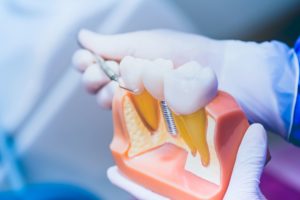3 Habits That Could Harm Your Dental Implants
October 17, 2023

Dental implants are often considered the ideal method for replacing lost teeth because they’re the only option that functions like a natural tooth. They include a support rod that fuses with your jawbone which provides the stimulation necessary to preserve your facial structure when you bite or chew. Then, they’re capped with a tooth-shaped crown usually made of a composite resin material that’s customized to match your pearly whites.
In addition to all this, they have an incredibly high success rate of 95% in patients under 40 years old and 85% for those over 40. In fact, they’re so reliable that they can last for decades if cared for properly. With that in mind, we’ve put together a list of a few bad habits you might have that could jeopardize your dental implant. You wouldn’t want to invest the time and resources into having them placed just for them to fail, after all! Keep reading to learn 3 things to avoid.
Habit #1: Indulging Your Sweet Tooth
Many patients are thrilled to learn that dental implants don’t come with a list of dietary restrictions like dentures and bridges often do. They’re considered permanently embedded once they fully heal, so there’s no real concern that food will dislodge them or bend them out of shape.
That said, sugar from the foods you eat still attracts bacteria that can penetrate around your dental implant or below the gum line. If left untreated, it could cause gum disease that can penetrate into your jawbone. In time it could weaken enough that it can no longer support your teeth, including your dental implants. By skipping sugary treats, you’ll give your implant the best shot at success for the long haul.
Habit #2: Smoking Cigarettes
Did you know that nicotine reduces the oxygen levels in your blood as well as your blood flow? As a result, if you smoke cigarettes or use tobacco products then your body can’t deliver the necessary nutrients to your gums to keep them healthy. Smoking is known to cause dental implant failure both immediately following your surgical procedure as well as once you’ve fully healed. That means there’s never a good time to partake if you want them to last.
They’re also known to cause cancer and other significant health conditions, so it’s not just your mouth you’re hurting. Keep your body and your mouth happy and steer clear of cigarettes, vapes, and other forms of tobacco.
Habit #3: Skipping Your Oral Care Routine
Though your dental implant itself cannot get a cavity, you’ll still need to brush and floss it just like your remaining teeth. This ensures that unwanted germs are regularly cleaned out so that you are less likely to have tooth decay or gum disease. Even if you’ve lost all your teeth, it’s still possible to contract gingivitis which can worsen over time. It can spread to your jaw as well as infect your bloodstream and travel to other areas of your body. You could develop heart conditions or other complications if it goes unchecked.
Now that you know the importance of caring for your dental implants properly, you can keep your full, beautiful smile for decades!
About the Author
Dr. Terry F. Rakowsky has nearly 35 years of experience helping patients transform their smiles for the better. He graduated from Penn State and then pursued his dental doctorate at the University of Pennsylvania School of Dental Medicine. He has also completed ongoing education hours at the world-renowned Dawson Academy and Las Vegas Institute for Advanced Dental Studies. He uses state-of-the-art instruments and technology to give you top-tier care that you can trust. If you’re interested in dental implants and would like a consultation, you’re welcome to contact the office on the website or by calling (215) 348-2224.
No Comments
No comments yet.
RSS feed for comments on this post.
Sorry, the comment form is closed at this time.
